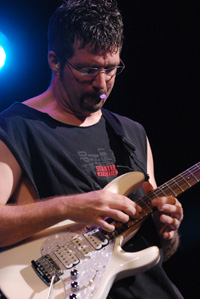"I specialize in rock techniques for guitar. Students know me for the two-hand tapping technique: I use both hands together on the fret board, and have reorganized the fret board to accommodate that. It's the same tuning; it's just that I don't use some of the traditional scale patterns. Everything is based around four notes per string. Students come to me for technique, but I want them to understand that technique is a means to an end, and that end should always be something musical."
"When I was a first-semester student going to all those different classes, I was studying hard and getting As on tests, but I wasn't sure why I was learning a lot of what I was learning. In my second and third semester, all of a sudden things started to click. So when I'm working with my students, I've learned to anticipate when they're wondering, 'Why are you making me do this?' and try to connect the dots for them."
"I think you get a deeper understanding of the way something complicated works when you can find a way to simplify it so someone else can understand it. It's also true that the more I understand something, the better I am at simplifying it. Every time I teach something, I learn new ways to look at it in a deeper way. That's one of the advantages of teaching. I feel in many respects like I'm still a student, because that's exactly what I am; I've just been doing it longer than my students."
"One of the most important things any instrumentalist can do is to come up with their own voice on the instrument. That's difficult to do, and it comes over time, but I'd like my students to begin the process here. I'd also like them to explore as many approaches and styles of guitar music as they can while they're here. If a rock guitarist can study jazz, how beneficial would that be, to take something away from that idiom and really influence their rock playing in a positive way?"

